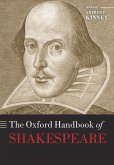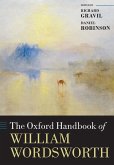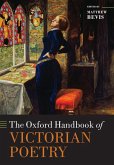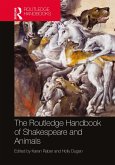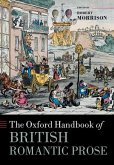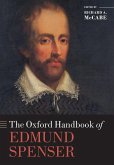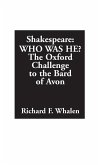The Oxford Handbook of Shakespeare and Embodiment
Gender, Sexuality, and Race
Herausgeber: Traub, Valerie
Schade – dieser Artikel ist leider ausverkauft. Sobald wir wissen, ob und wann der Artikel wieder verfügbar ist, informieren wir Sie an dieser Stelle.
The Oxford Handbook of Shakespeare and Embodiment
Gender, Sexuality, and Race
Herausgeber: Traub, Valerie
- Broschiertes Buch
- Merkliste
- Auf die Merkliste
- Bewerten Bewerten
- Teilen
- Produkt teilen
- Produkterinnerung
- Produkterinnerung
The Oxford Handbook of Shakespeare and Embodiment brings together 42 of the most important scholars writing on the subject today. They explore representations of gender in the context of race, ethnicity, sexuality, disability, and religion, and consider Shakespeare's life, contemporary editing practices, and the performance of his plays.
Andere Kunden interessierten sich auch für
![The Oxford Handbook of Shakespeare The Oxford Handbook of Shakespeare]() The Oxford Handbook of Shakespeare63,99 €
The Oxford Handbook of Shakespeare63,99 €![The Oxford Handbook of William Wordsworth The Oxford Handbook of William Wordsworth]() The Oxford Handbook of William Wordsworth58,99 €
The Oxford Handbook of William Wordsworth58,99 €![The Oxford Handbook of Victorian Poetry The Oxford Handbook of Victorian Poetry]() The Oxford Handbook of Victorian Poetry61,99 €
The Oxford Handbook of Victorian Poetry61,99 €![The Routledge Handbook of Shakespeare and Animals The Routledge Handbook of Shakespeare and Animals]() The Routledge Handbook of Shakespeare and Animals307,99 €
The Routledge Handbook of Shakespeare and Animals307,99 €![The Oxford Handbook of British Romantic Prose The Oxford Handbook of British Romantic Prose]() The Oxford Handbook of British Romantic Prose219,99 €
The Oxford Handbook of British Romantic Prose219,99 €![The Oxford Handbook of Edmund Spenser The Oxford Handbook of Edmund Spenser]() Richard A. MccabeThe Oxford Handbook of Edmund Spenser62,99 €
Richard A. MccabeThe Oxford Handbook of Edmund Spenser62,99 €![Shakespeare--Who Was He? The Oxford Challenge to the Bard of Avon Shakespeare--Who Was He? The Oxford Challenge to the Bard of Avon]() Richard WhalenShakespeare--Who Was He? The Oxford Challenge to the Bard of Avon60,99 €
Richard WhalenShakespeare--Who Was He? The Oxford Challenge to the Bard of Avon60,99 €-
-
The Oxford Handbook of Shakespeare and Embodiment brings together 42 of the most important scholars writing on the subject today. They explore representations of gender in the context of race, ethnicity, sexuality, disability, and religion, and consider Shakespeare's life, contemporary editing practices, and the performance of his plays.
Produktdetails
- Produktdetails
- Verlag: OUP Oxford
- Seitenzahl: 808
- Erscheinungstermin: 8. Februar 2018
- Englisch
- Abmessung: 244mm x 170mm x 43mm
- Gewicht: 1366g
- ISBN-13: 9780198820406
- ISBN-10: 0198820402
- Artikelnr.: 49134874
- Herstellerkennzeichnung
- Libri GmbH
- Europaallee 1
- 36244 Bad Hersfeld
- gpsr@libri.de
- Verlag: OUP Oxford
- Seitenzahl: 808
- Erscheinungstermin: 8. Februar 2018
- Englisch
- Abmessung: 244mm x 170mm x 43mm
- Gewicht: 1366g
- ISBN-13: 9780198820406
- ISBN-10: 0198820402
- Artikelnr.: 49134874
- Herstellerkennzeichnung
- Libri GmbH
- Europaallee 1
- 36244 Bad Hersfeld
- gpsr@libri.de
Valerie Traub is the Frederick G. L. Huetwell Professor of English and Women's Studies at the University of Michigan and an award winning author and teacher. She is the author of The Renaissance of Lesbianism in Early Modern England (Cambridge University Press, 2002), Desire & Anxiety: Circulations of Sexuality in Shakespearean Drama (Routledge, 1992; rpt 2014), and most recently Thinking Sex with the Early Moderns (Pennsylvania University Press, 2015). She co-edited Gay Shame (University of Chicago Press, 2009) and Feminist Readings of Early Modern Culture: Emerging Subjects (Cambridge University Press, 1996). Her current project is Mapping Embodiment in the Early Modern West: A Prehistory of Normality.
* 1: Valerie Traub: Introduction: Feminist Shakespeare Studies: Cross
Currents, Border Crossings, Conflicts, and Contradictions
* Part I: The Lives of William Shakespeare
* 2: Lena Cowen Orlin: Shakespeare's Marriage
* 3: Alan Stewart: The Undocumented Lives of William Shakespeare
* Part II: Early Modern Women's Lives
* 4: Bernadette Andrea: Amazons, Turks, and Tartars in the Gesta
Grayorum and The Comedy of Errors
* 5: Stephen Spiess: Puzzling Embodiment: Proclamation, La Pucelle, and
The first Part of Henry VI'
* 6: Susan Frye: Spectres of Female Sovereignty in Shakespeare's Plays
* 7: Wendy Wall: All's Well That Ends Well and Recipe Cultures of
Knowledge
* Part III: Race and Ethnicity in Local and Transnational Contexts
* 8: M. Lindsay Kaplan: Constructing the Inferior Body: Medieval
Theology in The Merchant of Venice
* 9: Ian Smith: The Textile Black Body: Race and 'shadowed livery' in
The Merchant of Venice
* 10: Patricia Akhimie: Bruised with Adversity: Reading Race in The
Comedy of Errors
* 11: Emily C. Bartels: Identifying 'the Dane': Gender and Race in
Hamlet
* 12: Jean E. Feerick: The Imperial Graft: Horticulture, Hybridity, and
the Art of Mingling Races in Henry V and Cymbeline
* 13: Ania Loomba: Identities and Bodies in Early Modern Studies
* Part IV: Sexualities
* 14: Julie Crawford: Shakespeare. Same Sex. Marriage
* 15: Kathryn Schwarz: Comedies End in Marriage
* 16: Will Stockton: The Fierce Urgency of Now: Queer Theory,
Presentism, and Romeo and Juliet
* 17: Melissa E. Sanchez: Impure Resistance: Heteroeroticism, Feminism,
and Shakespearean Tragedy
* 18: Carol Thomas Neely: 'Strange Things in Hand': Perverse Pleasures
and Erotic Triangles in The Merry Wives of Windsor
* 19: William Fisher: 'Stray[ing] lower where the pleasant fountains
lie': Cunnilingus in Venus and Adonis and in English Culture,
c.1600-1700
* 20: Karen Raber: Equeer: Human-Equine Erotics in 1 Henry IV
* Part V: Embodied Worlds, Reconfigured Agencies
* 21: Elizabeth D. Harvey: Passionate Spirits: Animism and Embodiment
in Cymbeline and The Tempest
* 22: Mario DiGangi: Entangled Agency: The Assassin's Conscience in
Richard III and King John
* 23: Amanda Bailey: Personification and the Political Imagination of
A Midsummer Night's Dream
* 24: Gina Bloom: Time to Cheat: Chess and The Tempest's Performative
History of Dynastic Marriage
* 25: Tobin Siebers: Shakespeare Differently Disabled
* 26: Vin Nardizzi: Disability Figures in Shakespeare
* 27: Marjorie Rubright: Incorporating Kate: The Myth of Monolingualism
in Shakespeare's Henry the Fifth
* 28: Ari Friedlander: Roguery and Reproduction in The Winter's Tale
* 29: Maureen Quilligan: Exit Pursued by a Bear: Staging Animal Bodies
in A Winter's Tale
* Part VI: Textual Production and Reproduction
* 30: Laurie Maguire: Typographical Embodiment: The Case of etcetera
* 31: Valerie Wayne: The Gendered Text and Its Labour
* 32: Jeffrey Masten: Glossing and T*pping: Editing Sexuality, Race,
and Gender in Othello
* Part VII: Cultural Performances Past and Present
* 33: Kathleen E. McLuskie: A Time for The Merry Wives of Windsor
* 34: Jennifer Waldron: Dead Likenesses and Sex Machines: Shakespearean
Media Theory
* 35: Evelyn Tribble: Pretty and Apt: Boy Actors, Skill, and Embodiment
* 36: Holly Dugan: Double Falsehood: Cardenio and the Lost History of
Rape
* 37: Jean E. Howard: Interrupting the Lucrece Effect? The Performance
of Rape on the Early Modern Stage
* 38: Diana E. Henderson: Magic in the Chains: Othello, Omkara, and the
Materiality of Gender Across Time and Media
* 39: Susan Bennett: Precarious Bodies: Romeo and Juliet in Baghdad at
the World Shakespeare Festival
* 40: Lauren Eriks Cline: Becoming Caliban: Monster Methods and
Performance Theories
* 41: Ayanna Thompson and Laura Turchi: Embodiment and the Classroom
Performance
* 42: Denise Albanese: Feeling Shakespeare
Currents, Border Crossings, Conflicts, and Contradictions
* Part I: The Lives of William Shakespeare
* 2: Lena Cowen Orlin: Shakespeare's Marriage
* 3: Alan Stewart: The Undocumented Lives of William Shakespeare
* Part II: Early Modern Women's Lives
* 4: Bernadette Andrea: Amazons, Turks, and Tartars in the Gesta
Grayorum and The Comedy of Errors
* 5: Stephen Spiess: Puzzling Embodiment: Proclamation, La Pucelle, and
The first Part of Henry VI'
* 6: Susan Frye: Spectres of Female Sovereignty in Shakespeare's Plays
* 7: Wendy Wall: All's Well That Ends Well and Recipe Cultures of
Knowledge
* Part III: Race and Ethnicity in Local and Transnational Contexts
* 8: M. Lindsay Kaplan: Constructing the Inferior Body: Medieval
Theology in The Merchant of Venice
* 9: Ian Smith: The Textile Black Body: Race and 'shadowed livery' in
The Merchant of Venice
* 10: Patricia Akhimie: Bruised with Adversity: Reading Race in The
Comedy of Errors
* 11: Emily C. Bartels: Identifying 'the Dane': Gender and Race in
Hamlet
* 12: Jean E. Feerick: The Imperial Graft: Horticulture, Hybridity, and
the Art of Mingling Races in Henry V and Cymbeline
* 13: Ania Loomba: Identities and Bodies in Early Modern Studies
* Part IV: Sexualities
* 14: Julie Crawford: Shakespeare. Same Sex. Marriage
* 15: Kathryn Schwarz: Comedies End in Marriage
* 16: Will Stockton: The Fierce Urgency of Now: Queer Theory,
Presentism, and Romeo and Juliet
* 17: Melissa E. Sanchez: Impure Resistance: Heteroeroticism, Feminism,
and Shakespearean Tragedy
* 18: Carol Thomas Neely: 'Strange Things in Hand': Perverse Pleasures
and Erotic Triangles in The Merry Wives of Windsor
* 19: William Fisher: 'Stray[ing] lower where the pleasant fountains
lie': Cunnilingus in Venus and Adonis and in English Culture,
c.1600-1700
* 20: Karen Raber: Equeer: Human-Equine Erotics in 1 Henry IV
* Part V: Embodied Worlds, Reconfigured Agencies
* 21: Elizabeth D. Harvey: Passionate Spirits: Animism and Embodiment
in Cymbeline and The Tempest
* 22: Mario DiGangi: Entangled Agency: The Assassin's Conscience in
Richard III and King John
* 23: Amanda Bailey: Personification and the Political Imagination of
A Midsummer Night's Dream
* 24: Gina Bloom: Time to Cheat: Chess and The Tempest's Performative
History of Dynastic Marriage
* 25: Tobin Siebers: Shakespeare Differently Disabled
* 26: Vin Nardizzi: Disability Figures in Shakespeare
* 27: Marjorie Rubright: Incorporating Kate: The Myth of Monolingualism
in Shakespeare's Henry the Fifth
* 28: Ari Friedlander: Roguery and Reproduction in The Winter's Tale
* 29: Maureen Quilligan: Exit Pursued by a Bear: Staging Animal Bodies
in A Winter's Tale
* Part VI: Textual Production and Reproduction
* 30: Laurie Maguire: Typographical Embodiment: The Case of etcetera
* 31: Valerie Wayne: The Gendered Text and Its Labour
* 32: Jeffrey Masten: Glossing and T*pping: Editing Sexuality, Race,
and Gender in Othello
* Part VII: Cultural Performances Past and Present
* 33: Kathleen E. McLuskie: A Time for The Merry Wives of Windsor
* 34: Jennifer Waldron: Dead Likenesses and Sex Machines: Shakespearean
Media Theory
* 35: Evelyn Tribble: Pretty and Apt: Boy Actors, Skill, and Embodiment
* 36: Holly Dugan: Double Falsehood: Cardenio and the Lost History of
Rape
* 37: Jean E. Howard: Interrupting the Lucrece Effect? The Performance
of Rape on the Early Modern Stage
* 38: Diana E. Henderson: Magic in the Chains: Othello, Omkara, and the
Materiality of Gender Across Time and Media
* 39: Susan Bennett: Precarious Bodies: Romeo and Juliet in Baghdad at
the World Shakespeare Festival
* 40: Lauren Eriks Cline: Becoming Caliban: Monster Methods and
Performance Theories
* 41: Ayanna Thompson and Laura Turchi: Embodiment and the Classroom
Performance
* 42: Denise Albanese: Feeling Shakespeare
* 1: Valerie Traub: Introduction: Feminist Shakespeare Studies: Cross
Currents, Border Crossings, Conflicts, and Contradictions
* Part I: The Lives of William Shakespeare
* 2: Lena Cowen Orlin: Shakespeare's Marriage
* 3: Alan Stewart: The Undocumented Lives of William Shakespeare
* Part II: Early Modern Women's Lives
* 4: Bernadette Andrea: Amazons, Turks, and Tartars in the Gesta
Grayorum and The Comedy of Errors
* 5: Stephen Spiess: Puzzling Embodiment: Proclamation, La Pucelle, and
The first Part of Henry VI'
* 6: Susan Frye: Spectres of Female Sovereignty in Shakespeare's Plays
* 7: Wendy Wall: All's Well That Ends Well and Recipe Cultures of
Knowledge
* Part III: Race and Ethnicity in Local and Transnational Contexts
* 8: M. Lindsay Kaplan: Constructing the Inferior Body: Medieval
Theology in The Merchant of Venice
* 9: Ian Smith: The Textile Black Body: Race and 'shadowed livery' in
The Merchant of Venice
* 10: Patricia Akhimie: Bruised with Adversity: Reading Race in The
Comedy of Errors
* 11: Emily C. Bartels: Identifying 'the Dane': Gender and Race in
Hamlet
* 12: Jean E. Feerick: The Imperial Graft: Horticulture, Hybridity, and
the Art of Mingling Races in Henry V and Cymbeline
* 13: Ania Loomba: Identities and Bodies in Early Modern Studies
* Part IV: Sexualities
* 14: Julie Crawford: Shakespeare. Same Sex. Marriage
* 15: Kathryn Schwarz: Comedies End in Marriage
* 16: Will Stockton: The Fierce Urgency of Now: Queer Theory,
Presentism, and Romeo and Juliet
* 17: Melissa E. Sanchez: Impure Resistance: Heteroeroticism, Feminism,
and Shakespearean Tragedy
* 18: Carol Thomas Neely: 'Strange Things in Hand': Perverse Pleasures
and Erotic Triangles in The Merry Wives of Windsor
* 19: William Fisher: 'Stray[ing] lower where the pleasant fountains
lie': Cunnilingus in Venus and Adonis and in English Culture,
c.1600-1700
* 20: Karen Raber: Equeer: Human-Equine Erotics in 1 Henry IV
* Part V: Embodied Worlds, Reconfigured Agencies
* 21: Elizabeth D. Harvey: Passionate Spirits: Animism and Embodiment
in Cymbeline and The Tempest
* 22: Mario DiGangi: Entangled Agency: The Assassin's Conscience in
Richard III and King John
* 23: Amanda Bailey: Personification and the Political Imagination of
A Midsummer Night's Dream
* 24: Gina Bloom: Time to Cheat: Chess and The Tempest's Performative
History of Dynastic Marriage
* 25: Tobin Siebers: Shakespeare Differently Disabled
* 26: Vin Nardizzi: Disability Figures in Shakespeare
* 27: Marjorie Rubright: Incorporating Kate: The Myth of Monolingualism
in Shakespeare's Henry the Fifth
* 28: Ari Friedlander: Roguery and Reproduction in The Winter's Tale
* 29: Maureen Quilligan: Exit Pursued by a Bear: Staging Animal Bodies
in A Winter's Tale
* Part VI: Textual Production and Reproduction
* 30: Laurie Maguire: Typographical Embodiment: The Case of etcetera
* 31: Valerie Wayne: The Gendered Text and Its Labour
* 32: Jeffrey Masten: Glossing and T*pping: Editing Sexuality, Race,
and Gender in Othello
* Part VII: Cultural Performances Past and Present
* 33: Kathleen E. McLuskie: A Time for The Merry Wives of Windsor
* 34: Jennifer Waldron: Dead Likenesses and Sex Machines: Shakespearean
Media Theory
* 35: Evelyn Tribble: Pretty and Apt: Boy Actors, Skill, and Embodiment
* 36: Holly Dugan: Double Falsehood: Cardenio and the Lost History of
Rape
* 37: Jean E. Howard: Interrupting the Lucrece Effect? The Performance
of Rape on the Early Modern Stage
* 38: Diana E. Henderson: Magic in the Chains: Othello, Omkara, and the
Materiality of Gender Across Time and Media
* 39: Susan Bennett: Precarious Bodies: Romeo and Juliet in Baghdad at
the World Shakespeare Festival
* 40: Lauren Eriks Cline: Becoming Caliban: Monster Methods and
Performance Theories
* 41: Ayanna Thompson and Laura Turchi: Embodiment and the Classroom
Performance
* 42: Denise Albanese: Feeling Shakespeare
Currents, Border Crossings, Conflicts, and Contradictions
* Part I: The Lives of William Shakespeare
* 2: Lena Cowen Orlin: Shakespeare's Marriage
* 3: Alan Stewart: The Undocumented Lives of William Shakespeare
* Part II: Early Modern Women's Lives
* 4: Bernadette Andrea: Amazons, Turks, and Tartars in the Gesta
Grayorum and The Comedy of Errors
* 5: Stephen Spiess: Puzzling Embodiment: Proclamation, La Pucelle, and
The first Part of Henry VI'
* 6: Susan Frye: Spectres of Female Sovereignty in Shakespeare's Plays
* 7: Wendy Wall: All's Well That Ends Well and Recipe Cultures of
Knowledge
* Part III: Race and Ethnicity in Local and Transnational Contexts
* 8: M. Lindsay Kaplan: Constructing the Inferior Body: Medieval
Theology in The Merchant of Venice
* 9: Ian Smith: The Textile Black Body: Race and 'shadowed livery' in
The Merchant of Venice
* 10: Patricia Akhimie: Bruised with Adversity: Reading Race in The
Comedy of Errors
* 11: Emily C. Bartels: Identifying 'the Dane': Gender and Race in
Hamlet
* 12: Jean E. Feerick: The Imperial Graft: Horticulture, Hybridity, and
the Art of Mingling Races in Henry V and Cymbeline
* 13: Ania Loomba: Identities and Bodies in Early Modern Studies
* Part IV: Sexualities
* 14: Julie Crawford: Shakespeare. Same Sex. Marriage
* 15: Kathryn Schwarz: Comedies End in Marriage
* 16: Will Stockton: The Fierce Urgency of Now: Queer Theory,
Presentism, and Romeo and Juliet
* 17: Melissa E. Sanchez: Impure Resistance: Heteroeroticism, Feminism,
and Shakespearean Tragedy
* 18: Carol Thomas Neely: 'Strange Things in Hand': Perverse Pleasures
and Erotic Triangles in The Merry Wives of Windsor
* 19: William Fisher: 'Stray[ing] lower where the pleasant fountains
lie': Cunnilingus in Venus and Adonis and in English Culture,
c.1600-1700
* 20: Karen Raber: Equeer: Human-Equine Erotics in 1 Henry IV
* Part V: Embodied Worlds, Reconfigured Agencies
* 21: Elizabeth D. Harvey: Passionate Spirits: Animism and Embodiment
in Cymbeline and The Tempest
* 22: Mario DiGangi: Entangled Agency: The Assassin's Conscience in
Richard III and King John
* 23: Amanda Bailey: Personification and the Political Imagination of
A Midsummer Night's Dream
* 24: Gina Bloom: Time to Cheat: Chess and The Tempest's Performative
History of Dynastic Marriage
* 25: Tobin Siebers: Shakespeare Differently Disabled
* 26: Vin Nardizzi: Disability Figures in Shakespeare
* 27: Marjorie Rubright: Incorporating Kate: The Myth of Monolingualism
in Shakespeare's Henry the Fifth
* 28: Ari Friedlander: Roguery and Reproduction in The Winter's Tale
* 29: Maureen Quilligan: Exit Pursued by a Bear: Staging Animal Bodies
in A Winter's Tale
* Part VI: Textual Production and Reproduction
* 30: Laurie Maguire: Typographical Embodiment: The Case of etcetera
* 31: Valerie Wayne: The Gendered Text and Its Labour
* 32: Jeffrey Masten: Glossing and T*pping: Editing Sexuality, Race,
and Gender in Othello
* Part VII: Cultural Performances Past and Present
* 33: Kathleen E. McLuskie: A Time for The Merry Wives of Windsor
* 34: Jennifer Waldron: Dead Likenesses and Sex Machines: Shakespearean
Media Theory
* 35: Evelyn Tribble: Pretty and Apt: Boy Actors, Skill, and Embodiment
* 36: Holly Dugan: Double Falsehood: Cardenio and the Lost History of
Rape
* 37: Jean E. Howard: Interrupting the Lucrece Effect? The Performance
of Rape on the Early Modern Stage
* 38: Diana E. Henderson: Magic in the Chains: Othello, Omkara, and the
Materiality of Gender Across Time and Media
* 39: Susan Bennett: Precarious Bodies: Romeo and Juliet in Baghdad at
the World Shakespeare Festival
* 40: Lauren Eriks Cline: Becoming Caliban: Monster Methods and
Performance Theories
* 41: Ayanna Thompson and Laura Turchi: Embodiment and the Classroom
Performance
* 42: Denise Albanese: Feeling Shakespeare


